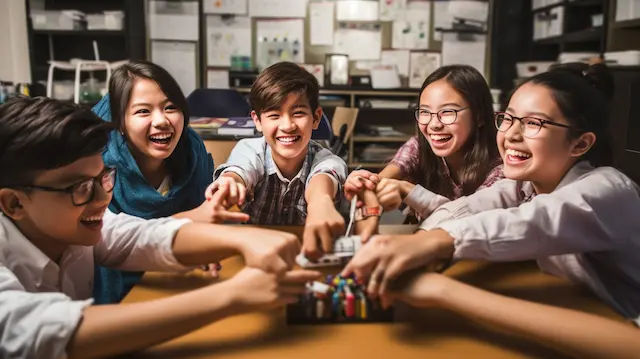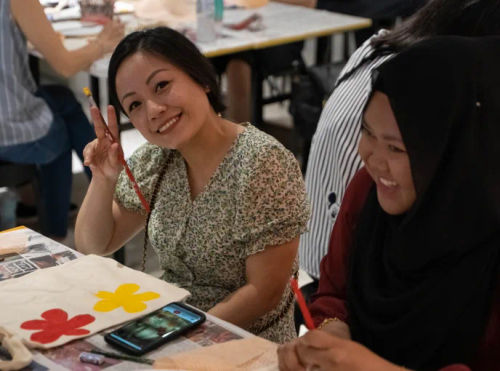Team Building Games For Students Singapore

Team building games are an essential component of a student’s educational journey, fostering skills that go beyond traditional academics. In Singapore, a city known for its multiculturalism and diverse student population, team building activities hold even greater significance. These games provide students with opportunities to develop teamwork, communication, and problem-solving skills while embracing the rich tapestry of cultures within the country. By engaging in fun and interactive team building games, students can enhance their personal growth and prepare for the challenges of the future.
Overview of Team Building Games
Team building games are purposefully designed activities that aim to strengthen bonds, encourage collaboration, and cultivate a positive learning environment. These games can take various forms, ranging from physical challenges to intellectual puzzles and problem-solving exercises. The primary goal is to engage students in activities that require them to work together, communicate effectively, and think critically. By participating in team building games, students can experience the power of collaboration and understand the value of collective effort.
Importance of Team Building Games for Students
Team building games hold immense importance for students as they contribute to their overall development and growth. These games provide a platform for students to hone essential social skills, such as effective communication, active listening, and conflict resolution. Moreover, team building activities foster leadership qualities and boost self-confidence, empowering students to take on new challenges and assume responsibilities. By engaging in these games, students also learn the value of teamwork, recognizing that collective effort can lead to greater achievements.
Benefits of Team Building Games for Students in Singapore
- Promoting Cultural Understanding: Team building games provide opportunities for students from diverse cultural backgrounds to collaborate and work together, fostering cross-cultural understanding and appreciation in Singapore’s multicultural society.
- Developing Collaboration Skills: By participating in team building games, students learn how to effectively collaborate with their peers, emphasizing the value of collective effort and teamwork.
- Enhancing Communication Abilities: Team building games encourage students to communicate their ideas, actively listen to others, and express themselves effectively, leading to improved communication skills in various contexts.
- Cultivating Leadership Qualities: Through team building games, students have the chance to develop and showcase leadership skills, such as taking initiative, delegating tasks, and guiding their team towards success.
- Building Trust and Relationships: Team building games help build trust and foster positive relationships among students, creating a supportive and inclusive learning environment.
- Nurturing Problem-Solving Skills: Team building activities often present students with challenges that require creative problem-solving, encouraging them to think critically and develop innovative solutions.
- Boosting Self-Confidence: Successful participation in team building games can boost students’ self-confidence and belief in their abilities, empowering them to take on new challenges with resilience.
- Preparing for Professional Environments: Teamwork and collaboration are highly valued in Singapore’s education system and professional settings. Team building games prepare students for future careers by providing practical experiences in working effectively with others.
- Enhancing Social and Emotional Skills: Team building games promote the development of social and emotional skills, including empathy, patience, adaptability, and conflict resolution.
- Creating a Positive Learning Environment: Incorporating team building games into the educational journey fosters a positive and engaging learning environment, where students can thrive academically and personally.
Best Team Building Games For Students Singapore
1. Art Jamming Workshop

Engage students’ creativity and teamwork with an Art Jamming Workshop where they can unleash their artistic talents. This activity involves students working together to create a collaborative art piece or individual artworks in a relaxed and supportive environment. Through this workshop, students can express themselves, appreciate different art styles, and collaborate on a collective masterpiece, fostering teamwork and creative thinking.
2. Beach Ball Bonanza

The Beach Ball Bonanza is a lively and energetic team building game that takes place on the beach. Students are divided into teams and engage in various fun-filled activities using beach balls. From beach volleyball to relay races and beach ball toss challenges, this game encourages teamwork, coordination, and friendly competition. It offers a refreshing outdoor experience and promotes physical activity while building strong bonds among students.
3. The Great Egg Drop

The Great Egg Drop is an exciting challenge where students design and construct protective devices to prevent raw eggs from breaking when dropped from a height. Working in teams, students use everyday materials like straws, balloons, and tape to create innovative egg-drop contraptions. This game encourages critical thinking, problem-solving, and collaboration as students aim to protect their eggs and achieve a successful landing.
4. Tower of Success

The Tower of Success game tests students’ communication and teamwork skills as they work together to construct the tallest tower using given materials. Students must strategize, assign roles, and effectively communicate to ensure stability and height. This activity fosters collaboration, problem-solving, and time management skills while promoting a sense of achievement when a towering structure is successfully built.
5. Puzzle Race

The Puzzle Race is a thrilling game where teams compete to solve puzzles against the clock. Each team receives a puzzle to solve, and they must work together to piece it together as quickly as possible. This activity enhances problem-solving abilities, teamwork, and effective communication under time pressure. The competitive element adds excitement and encourages students to collaborate and strategize to complete the puzzle before their opponents.
6. Obstacle Course Relay

The Obstacle Course Relay is an action-packed team building game where teams race against each other through a series of challenging obstacles. Students must work together, overcome obstacles, and pass the baton to the next teammate until the final member crosses the finish line. This game promotes teamwork, communication, and resilience as students navigate physical challenges and support each other to achieve victory.
7. Marshmallow Challenge

The Marshmallow Challenge is a creative and engaging activity where teams compete to build the tallest freestanding structure using only spaghetti sticks, tape, and a marshmallow placed on top. This game encourages innovation, problem-solving, and teamwork as students collaborate to design and construct stable structures within a given time limit. The challenge lies in balancing creativity, structural integrity, and effective collaboration to create the tallest marshmallow tower.
8. Mission Impossible

Mission Impossible is an exhilarating team building game inspired by spy movies. Students are assigned secret missions and must work together to solve clues, crack codes, and complete challenges to accomplish their mission objectives. This game promotes critical thinking, collaboration, and quick decision-making skills in a fun and immersive environment. Students will experience the thrill of teamwork and problem-solving as they unravel mysteries and strive to accomplish their missions.
9. Build a Bridge

In the Build a Bridge game, students work together to construct a bridge using given materials that can support the weight of objects or individuals. This activity requires effective communication, planning, and problem-solving skills as teams design and build structurally sound bridges. Through this game, students learn about engineering principles, teamwork, and the importance of collaboration in creating a sturdy and reliable bridge.
10. Minefield

Minefield is a team building game that challenges students’ trust, communication, and problem-solving skills. Students navigate a simulated minefield blindfolded while receiving verbal instructions from their teammates to avoid stepping on “mines.” This activity emphasizes effective communication, active listening, and trust-building among team members. The game encourages students to rely on clear instructions, support each other, and develop problem-solving strategies to successfully maneuver through the minefield.
Tips for Successful Team Building Games
To ensure successful team building games, consider the following tips:
- Plan Ahead: Define clear objectives, select games suitable for the age group and setting, and ensure you have all necessary materials prepared.
- Establish Rules and Guidelines: Communicate the rules of the games, emphasizing the importance of fair play, respect, and inclusivity.
- Encourage Active Participation: Motivate students to actively engage in the games by creating a positive and supportive atmosphere.
- Reflect and Debrief: After each game, facilitate a debriefing session to encourage students to reflect on their experiences, identify lessons learned, and connect the games to real-life situations.
Team Building Games For Students Singapore
Team building games are a great way to foster collaboration, communication, and problem-solving skills among students in Singapore. These activities offer an immersive environment for learning while promoting physical activity and friendly competition. From beach ball challenges to tower construction and puzzle races, there is plenty of fun team building games that will engage your students’ minds and bodies. With careful planning and thoughtful execution, these activities can help create strong bonds among teammates and equip them with the necessary teamwork skills needed for success in school or life beyond the classroom.
Frequently Asked Questions (FAQ)
If you have any questions about team building games for students in Singapore, you can refer to the frequently asked questions (FAQ) about the best Fun Team Building Games for Students In Singapore below:
Are art jamming workshops suitable for students with no prior art experience?
Yes, art jamming workshops are designed to be inclusive and cater to students of all skill levels. These workshops provide a supportive and non-judgmental environment where students can freely express themselves and explore their creativity, regardless of their prior art experience.
Can the beach ball bonanza game be adapted for indoor settings?
Absolutely! While the beach ball bonanza is typically played on the beach, it can be adapted for indoor settings such as gymnasiums or large halls. Simply modify the game rules and adjust the activities to suit the indoor environment.
How can students protect their eggs in the Great Egg Drop game?
In the Great Egg Drop game, students can use various materials like straws, balloons, and tape to construct protective devices for the eggs. They can create structures with cushioning or shock-absorbing features to ensure the eggs remain intact upon impact.
Can the Tower of Success game be played with limited resources?
Yes, the Tower of Success game can be adapted based on the resources available. Students can use materials like paper cups, cardboard, or even recycled items to build their towers. The key is to encourage creativity and effective teamwork within the constraints of the given resources.
How can puzzle races be made more challenging for advanced students?
To make puzzle races more challenging for advanced students, you can increase the complexity of the puzzles, reduce the time limit, or introduce additional obstacles or rules. This will require students to think quickly, strategize effectively, and collaborate efficiently under increased pressure.
Are there safety precautions for the obstacle course relay game?
Yes, safety should always be a priority. Ensure the obstacle course is designed with appropriate safety measures and consider factors such as participant age, physical abilities, and supervision. Provide clear instructions and guidelines to ensure the safety and well-being of all participants.
How can educators incorporate the marshmallow challenge into the curriculum?
The marshmallow challenge can be integrated into various subjects, such as science, engineering, or team-building classes. Educators can link the activity to lessons on structural stability, problem-solving, or innovation. Students can learn about the importance of collaboration and brainstorming to create stable structures.
Can mission impossible games be adapted for different age groups?
Yes, mission impossible games can be adapted for different age groups by adjusting the complexity of the challenges and the level of difficulty. For younger students, simplify the puzzles and challenges, while for older students, introduce more intricate tasks and riddles to suit their cognitive abilities.
Are there real-life applications for the bridge-building game?
Absolutely! The bridge-building game introduces students to basic engineering principles and problem-solving skills. The concepts learned can be applied to real-life scenarios, such as civil engineering projects or even understanding the importance of structural integrity in everyday structures.
